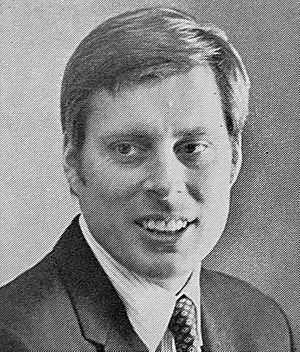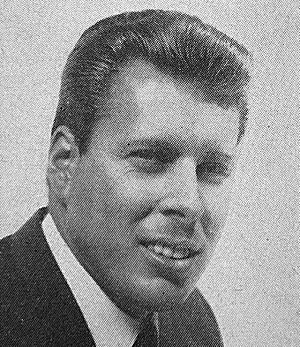John V. Tunney facts for kids
Quick facts for kids
John V. Tunney
|
|
|---|---|

Tunney c. 1970
|
|
| United States Senator from California |
|
| In office January 2, 1971 – January 1, 1977 |
|
| Preceded by | George Murphy |
| Succeeded by | S. I. Hayakawa |
| Member of the U.S. House of Representatives from California's 38th district |
|
| In office January 3, 1965 – January 2, 1971 |
|
| Preceded by | Patrick M. Martin |
| Succeeded by | Victor Veysey |
| Personal details | |
| Born |
John Varick Tunney
June 26, 1934 New York City, U.S. |
| Died | January 12, 2018 (aged 83) Santa Monica, California, U.S. |
| Political party | Democratic |
| Spouses |
Mieke Sprengers
(m. 1959; div. 1973)Kathinka Osborne
(m. 1977) |
| Children | 3 |
| Parents | Gene Tunney Polly Lauder |
| Relatives | Lauder Greenway Family |
| Education | Yale University (BA) University of Virginia (LLB) |
| Military service | |
| Allegiance | |
| Branch/service | |
| Years of service | 1960–1963 |
| Rank | |
| Unit | Air Force Judge Advocate General's Corps |
John Varick Tunney (June 26, 1934 – January 12, 2018) was an American politician. He served as a United States Senator and a Representative for California. He was active in politics during the 1960s and 1970s.
John Tunney was the son of famous boxing champion Gene Tunney.
| Top - 0-9 A B C D E F G H I J K L M N O P Q R S T U V W X Y Z |
Early Life and Education
John Tunney was born in New York City. His father was J. Joseph "Gene" Tunney, a heavyweight boxing champion. His mother, Polly Lauder Tunney, came from the Lauder Greenway Family. John grew up on his family's farm in Stamford, Connecticut. He went to New Canaan Country School and Westminster School.
He graduated from Yale University in 1956. He studied anthropology there. Later, he attended The Hague Academy of International Law in the Netherlands. In 1959, he earned a law degree from the University of Virginia School of Law. While at law school, he was roommates with Ted Kennedy, who later became a senator. They remained close friends.
Military Service and Early Career
After law school, Tunney became a lawyer in New York City. In 1959, he married his first wife, Mieke Sprengers.
He joined the United States Air Force as a judge advocate. This means he was a lawyer for the military. He served until 1963, reaching the rank of captain.
In the early 1960s, Tunney taught business law. He taught at the University of California, Riverside. In 1963, he started practicing law in California. He also advised a special committee for President John F. Kennedy. This committee focused on youth crime.
Serving in Congress
In 1964, John Tunney was elected to the United States House of Representatives. He was a Democrat representing California's 38th district. This district included Riverside and Imperial counties. He served in the House from January 1965 until January 1971. He resigned to become a senator.
In 1969, while he was a congressman, Tunney helped his friend Senator Kennedy. This was after an accident in Hyannisport. In 1970, he was made an honorary member of the Phi Sigma Kappa fraternity. This was for his "service to the state."
Becoming a United States Senator
In 1970, Tunney decided to run for the Senate. He wanted to become a U.S. Senator for California. He faced a tough primary election against another congressman, George Brown, Jr.. One big topic in the election was the military draft.
After winning the primary, Tunney ran against the Republican senator, George Murphy. Senator Murphy supported the Vietnam War, which was unpopular. Tunney used his youth and energy to contrast with the older Murphy. People compared his look to Robert F. Kennedy.
In the 1970 election, Californians re-elected Republican governor Ronald Reagan. But they also elected Democrat John Tunney to the Senate. This showed that voters sometimes choose different parties for different offices.
Senatorial Work and Key Issues
As a senator, Tunney created a weekly radio report for California. In these reports, he often interviewed other lawmakers. In 1974, he wrote a bill about antitrust laws. This bill was called the Tunney Act. It aimed to prevent unfair business practices.
He also wrote a book called The Changing Dream. In this book, he talked about a coming crisis with natural resources.
In 1975, Tunney played a big role in a debate about the Angolan Civil War. The U.S. government wanted to secretly support rebels in Angola. Many worried this could lead to another war like Vietnam. Tunney believed in using diplomacy instead of military action.
The CIA gave secret briefings to senators. They explained how money was being spent in Angola. But Tunney was not convinced it was a good idea. He proposed an amendment to cut $33 million from the defense budget. This money was meant for secret operations in Angola.
The Ford administration strongly opposed Tunney's amendment. They said it would hurt U.S. relations with other countries. But on December 20, 1975, Tunney's amendment passed. It passed with strong support from both parties. This vote showed that Congress wanted more power in foreign affairs.
Reelection Campaign and Later Life
In 1976, Tunney ran for a second term as senator. He won his party's nomination. But he lost the general election to Republican S. I. Hayakawa. Hayakawa was a former university president. He had never held elected office before.
Hayakawa ran as an "outsider." He pointed out that Tunney traveled a lot and missed some Senate votes. Tunney had been leading in the polls. But his lead got smaller as the election got closer. Even though Democrat Jimmy Carter won the presidential election, Tunney lost his Senate seat.
Tunney resigned his Senate seat on January 1, 1977. This was two days before his term officially ended. This allowed Hayakawa to gain seniority over other new senators. During his time as senator, Tunney served alongside Alan Cranston.
After his Senate defeat, Tunney returned to practicing law. He was a partner at a law firm called Manatt, Phelps, Rothenberg & Tunney. He also served on the boards of several companies.
Interest in Constitutional Rights
In 1975, Tunney became chairman of the Senate Judiciary Subcommittee on Constitutional Rights. He started a big investigation into surveillance technology. This means looking at how technology is used to watch people.
The 1976 Surveillance Technology Report said that this investigation was the first to gather so much information. It aimed to understand the threats from surveillance technology. Tunney said that "secret and unlimited acquisition of the most detailed knowledge about the most intimate aspects of a person's thoughts and actions conveys extraordinary power over that person's life."
Tunney also chaired the Commerce Subcommittee on Science and Technology. He was also a member of the Joint Atomic Energy Committee.
Personal Life
John Tunney's first marriage to Mieke Sprengers ended in 1972. They had three children together.
On April 23, 1977, Tunney married Kathinka Osborne. She was a member of the 1964 Swedish Olympic ski team. His longtime friend, Senator Kennedy, was his best man.
In 2003, Tunney joined other former senators in opposing the Iraq War.
John and Kathinka Tunney lived in Sun Valley, Idaho. They also had homes in New York and Los Angeles. He was chairman of the board for the Hammer Museum at UCLA. He also stayed involved in environmental causes. A pedestrian bridge at the Hammer Museum was named in his honor in 2015.
The 1972 film The Candidate, starring Robert Redford, was reportedly based on Tunney's 1970 Senate campaign.
John Tunney passed away on January 12, 2018. He was 83 years old and died from prostate cancer in Santa Monica, California.
See also
- List of United States senators from California
 | William Lucy |
 | Charles Hayes |
 | Cleveland Robinson |


